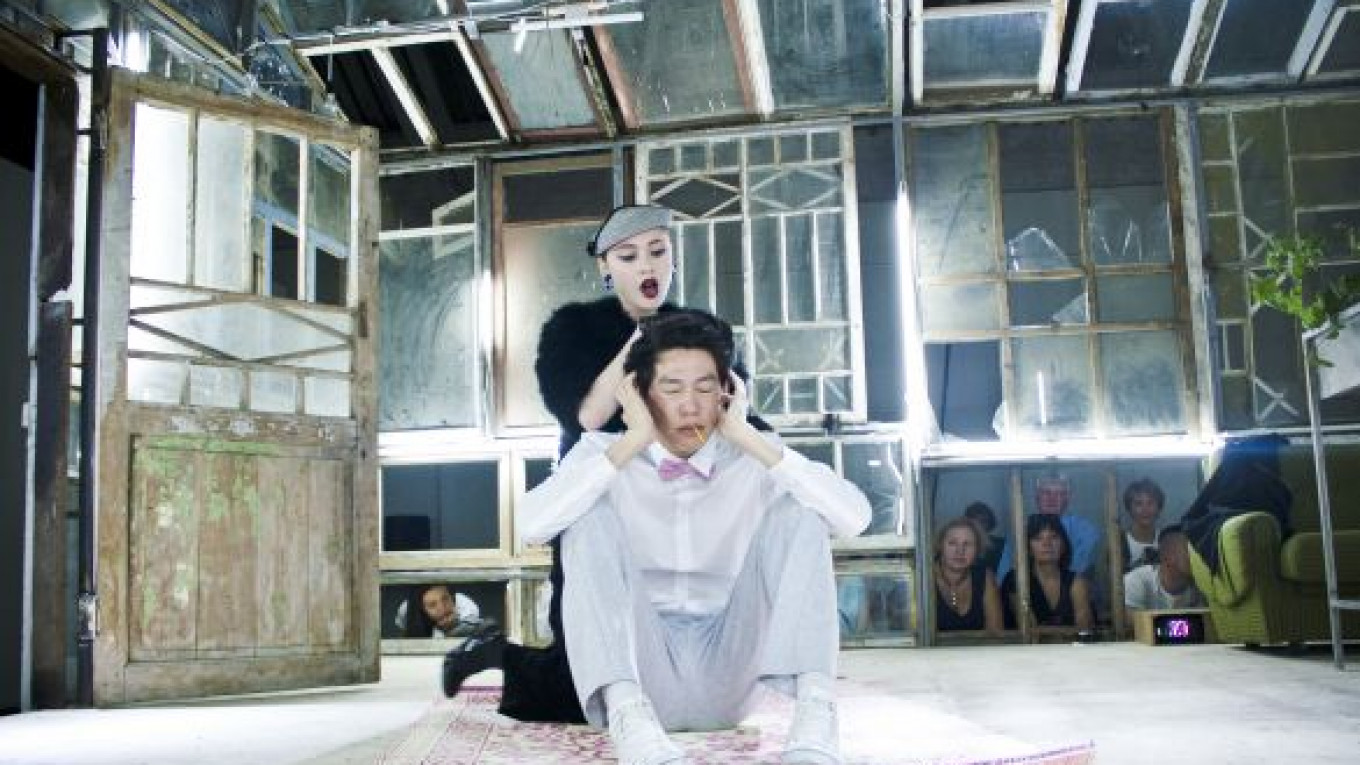Who would have guessed it, that by the beginning of winter the most popular play in Moscow would be "A Midsummer Night's Dream?"
Dmitry Krymov unveiled a spectacular and playful production of a fragment from this play in October at the School of Dramatic Art, and now Kirill Serebrennikov, working out of his own Seventh Studio in the Platforma project at the Winzavod complex, has put together a sometimes stunning version of the entire work.
I purposefully avoid calling it a "comedy" because Serebrennikov reaches deep into the darker corners of this tale about wood sprites, royalty and commoners cavorting about a forest in search of love and entertainment. There is plenty to laugh about as lovers pine, magic transforms personalities beyond recognition, and gods and people both make utter fools of themselves. But if Shakespeare used these common eventualities to poke fun at the human condition, Serebrennikov brings another aspect back into focus: Human follies are also often cruel, bloody and fatal.
Aided by dramaturg Valery Pecheikin and taking on the role of designer himself, the director pulled the tale apart and reassembled it, giving us four distinct narratives: The Story of Gods, The Story of People, The Story of Rulers, and The Story of Workers. They transpire on three different stages, the audience following the performers from place to place and back again.
Things commence in a broken-down greenhouse, the kind you might find at someone's dacha in the country. Broken panes of glass are tucked into weathered wooden frames and supports to create a kind of transparent mosaic. The audience sits around this object and watches as, inside, the stylish king and queen of the fairies plot some fun with Puck, performed here by numerous actors who turn the hobgoblin into a veritable army of sexually ambiguous individuals.
From there we move into another hall where sharply raked bleachers provide us with a bird's-eye-view of events involving the lovers Helena (Alexandra Revenko), Hermia (Maria Poyezzhayeva), Lysander (Rinal Mukhametov) and Demetrius (Ivan Fominov). The setting here is a schoolroom with trash bins nearby, supporting Serebrennikov's rendition of it as a super contemporary, and largely traditional, story of libido-laden youngsters.
The same hall, redesigned as something resembling a psychiatrist's office, hosts the third segment, a consideration of the relationship between Theseus, the Duke of Athens, and his fiancОe Hippolyta. Perhaps suffering from split personality disorders, they are played by two pairs of actors (Artur Beschastny and Ilya Romashko as Theseus, and Yana Irtenyeva and Yekaterina Steblina as Hippolyta).
This is where Serebrennikov's version takes its first sharp turn into the dark recesses underlying Shakespeare's play.
These two couples are too modern, too rich, too full of power for their own good. A sickness has invaded their romantic life, one in which dominance, humiliation and perversion are accepted as the norm. Any of their attempts to talk of "love" ring fake, rude or both. Violence, forced indignities and profound distrust replace traditional caresses or sweet talk.
There are a few moments when one suspects Serebrennikov wallows in the sickness of the events, rather than engaging it in a dialogue. This is particularly true when he has one of the women assume the pose of the cross as she is debased by her lover. Rather than seem subversive, it seems cheap and obvious.
But whatever doubts this scene may raise, the final segment of the craftsmen performing the play of Pyramus and Thisbe completely dispels them. After witnessing a prologue back in the greenhouse, the audience is invited into still another space, a huge hall almost filled with a round platform. As spectators gather around it and occasionally are encouraged to participate in small ways, the play-within-the-play unfolds primarily through the beautiful choreography of Anna Abalikhina.
Here the bumbling workers are reborn, to some extent, as artists of heightened sensitivity. The tale of Pyramus and Thisbe becomes their own and they embrace the tragedy of the doomed lovers fully.
It is a transformative scene that wipes out doubts and frustrations, which this long, nearly four-hour performance sometimes provokes. Structurally it is offered as something of an epilogue, although this is the segment that pulls the entire piece together and makes sense of it.
The image of Nikita Kukushkin as Pyramus and Filipp Avdeyev as Thisbe circling the stage in their death throes is quite unforgettable. What Shakespeare intended as lighthearted parody, Serebrennikov convincingly and beautifully delivers as full-on tragedy.
"A Midsummer Night's Dream" (Son v Letnyuyu Noch) plays Dec. 21-23, 25, 26, Jan. 7, 8, 9. at 8 p.m. at Winzavod. 1 4th Syromyatnichesky Pereulok, Bldg. 6. Metro Kurskaya. Tel. (495) 917-4646. www.winzavod.ru. Running time: 3 hours, 40 min.
A Message from The Moscow Times:
Dear readers,
We are facing unprecedented challenges. Russia's Prosecutor General's Office has designated The Moscow Times as an "undesirable" organization, criminalizing our work and putting our staff at risk of prosecution. This follows our earlier unjust labeling as a "foreign agent."
These actions are direct attempts to silence independent journalism in Russia. The authorities claim our work "discredits the decisions of the Russian leadership." We see things differently: we strive to provide accurate, unbiased reporting on Russia.
We, the journalists of The Moscow Times, refuse to be silenced. But to continue our work, we need your help.
Your support, no matter how small, makes a world of difference. If you can, please support us monthly starting from just $2. It's quick to set up, and every contribution makes a significant impact.
By supporting The Moscow Times, you're defending open, independent journalism in the face of repression. Thank you for standing with us.
Remind me later.







